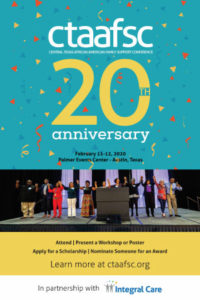February 21, 2020
Montandon Charitable Trust Awards Integral Care $25,000
In February 2020, Integral Care received a $25,000 grant award from the Montandon Charitable Trust to create a drop-in office space for 40 community-based staff in the Child and Family Services Division. This community workspace will offer opportunities for staff members to work in collaboration, sharing ideas and experiences that can help improve the services we provide to children with mental health, developmental, and behavioral challenges.
Staff who will utilize the drop-in space work with some of our highest need youth populations, including children enrolled in our Early Childhood Intervention (ECI) and Youth Empowerment Services (YES) Waiver programs. While community-based work is essential to meeting the needs of children and families in Early Childhood Intervention and YES Waiver programs, staff members face unique challenges to working outside a clinic.
Building a new drop-in office space is intended to increase staff engagement, build morale, and improve overall health outcomes for those we serve. When staff members have the opportunity to interact – whether in the break room, in a small meeting space, or with a visit to an adjacent cubicle, they can share their knowledge and work collaboratively to improve team performance.
December 17, 2019
Meadows Foundation Awards Integral Care $143,500
In November, Integral Care received a $143,500 grant from the Meadows Foundation to renew the Healthy Transitions Program, a collaboration between Integral Care and The University of Texas at Austin that supports transition-age youth. Funding will allow Integral Care to hire four part-time, near-age peer support specialists who will serve as transition navigators for youth who are transitioning from Child and Family Services to Adult Behavioral Health services or young adults between the ages of 18 and 25 who are new to mental health services and engaging with Adult Behavioral Health services.
By connecting each youth with one of our trained, near-age peer support specialists, we anticipate that we will increase the number of individuals who attend their intake appointment with Adult Behavioral Health services and improve our retention rate for youth remaining in Adult Behavioral Health services.
As in Year One of the project, Integral Care will engage experts in the University of Texas at Austin Steve Hicks School of Social Work to train the young adult peer support providers in the developmental needs of transition-age youth, effective engagement skills, and fidelity to the young adult peer model.
Integral Care, the Local Mental Health and Intellectual and Developmental Disability Authority for Travis County, announced today the appointment of Travis County Sheriff Sally Hernandez to its Board of Trustees. The appointment was a result of Senate Bill 632, which promotes Local Mental Health Authority (LMHA) cooperation with the criminal justice system by directing all LMHAs to appoint a sheriff or sheriff’s representative to their local governing board as an ex officio non-voting member.
October 17, 2019
City of Austin Budget Announcement
In September, Austin City Council passed its 2020 budget, with several provisions aimed at improving services for individuals experiencing a mental health crisis. The budget includes new funding commitments for Integral Care’s Expanded Mobile Crisis Outreach Team (EMCOT), mental health clinicians embedded at the 911 call center, additional mental health training for 911 dispatchers, a telehealth tool for first responders, and a staffing increase for Austin Travis County Emergency Medical Services Community Health Paramedics. These programs have already shown promise in improving crisis systems in our community.
EMCOT, which is jointly supported by the City of Austin (60% of funding) and Travis County (40% of funding), co-responds with law enforcement and EMS to divert individuals from emergency departments, arrest, involuntary commitments, and jail. Since the inception of the program in 2013, EMCOT has served 7,214 individuals and provided training for 1,500 law enforcement officers, EMS, and school resource officers.
City funding will also continue Integral Care’s successful telehealth pilot with Austin Police Department, helping to ensure access to care for individuals experiencing a mental health crisis. If first responders recognize that an individual is having a mental health crisis, they can offer a telehealth option, allowing individuals to connect with a trained clinician to provide support. Clients who choose telehealth can speak with MCOT staff via iPad. Staff then provide assessment and triage, assist with safety planning, and link them to community resources such as the Judge Guy Herman Center for Mental Health Crisis Care or crisis residential care.
Starting in December, EMCOT team members will be stationed at the 911 Call Center, where mental health calls will be transferred by 911 call takers to EMCOT. This means quicker assessment and triage of a person’s situation and the level of care they need. Under the city’s new budget, EMCOT will add 4 full-time clinicians.
Integral Care appreciates our longstanding city and county collaboration to improve crisis services for all in our community
The Central Texas African American Family Support Conference provides opportunities to learn about mental health, intellectual and developmental disabilities, substance use disorder, co-occurring disorders and much more. The mission of the conference is to strengthen family and individual awareness of available behavioral and physical health care services through culturally sensitive education, supports, and partnerships.
Find out more about the conference here.
Join the Facebook group -> CLICK HERE
September 28, 2019
Religious Coalition to Assist the Homeless Awards Integral Care $10,000
On September 27, Integral Care received a $10,000 grant from the Religious Coalition to Assist the Homeless (RCAH), a coalition of Austin-area faith communities that provides grant funds to social service providers to expand the capacity of local housing and shelter programs. Funding from RCAH will help Integral Care provide wraparound support services for the residents of Terrace at Oak Springs, our new permanent supportive housing community.
All Terrace residents have experienced chronic homelessness and live with mental illness, substance use disorder, and/or other chronic health conditions. In permanent supportive housing communities like Terrace at Oak Springs, offering flexible, voluntary support services can help individuals stay housed, build their self-sufficiency, and contribute to their communities. On-site wraparound services in the residential portion of the building will include case management, peer specialist support, benefits counseling, education, and job training/supported employment. Wraparound supports funded by RCAH will complement services provided through the 3000 Oak Springs Clinic, resulting in a holistic wellness and recovery approach for 50 residents.
As of December 17, 2019, 39 individuals have moved into their own apartments at Terrace at Oak Springs, all of whom can access wraparound support services.
September 12, 2019
SUPPORTING THE WHOLE HEALTH OF OUR CLIENTS
Recognizing that behavioral health and physical health go hand in hand, Integral Care works to address our clients’ whole health. This video highlights our care as a Certified Community Behavioral Health Clinic, one of the first 8 in the state.
September 12, 2019
INTEGRAL CARE LAUNCHES NEW STRATEGIC PLAN
Integral Care is excited to kick off a new strategic plan that will guide our work for the next three years. Watch this video featuring our leadership to learn how we plan to build on our strong foundation and core values to improve health and well-being in Austin-Travis County in 2020-22. READ FULL PLAN
The Austin Chronicle published an article focused on how Austin women are dispelling stigma and moving mental health issues forward. The article features Deborah Rosales-Elkins, Peer Support Specialist, and Ellen Richards, Chief Strategy Officer, as well as key Integral Care partners from NAMI Central Texas and Travis County Sheriff’s Office. Read it out here or grab the 7/4 issue off the stands.
The 86th Texas Legislative Session has come to a close with over 4,500 bills and resolutions passed. Legislators came together, strong in their bipartisan commitment to various issue areas including mental health, substance use disorder and intellectual and developmental disabilities (IDD).
Read more in our monthly newsletter, Transparencies.
Sorry, no results were found, search again?
Sorry, no results were found, search again?
Sorry, no results were found, search again?

